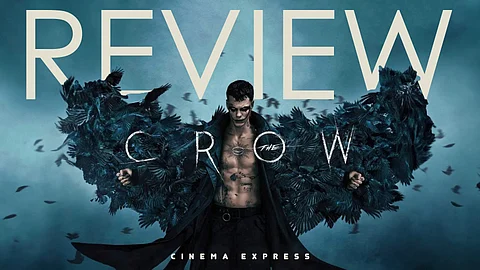

Alex Proyas’ 1994 film The Crow is a brooding, atmospheric thriller that explores themes like eternal love in the structure of a gothic revenge thriller. The film's focus on the love story is subtle yet impactful, building a strong emotional foundation for Eric Draven's desire for vengeance. Add to this an internalised and charismatic performance by the late Brandon Lee, and it is easy to see why the film still remains a cult favourite. Rupert Sanders’ remake is virtually everything The Crow is not. The film has little of the original’s intensity or visual wizardry.
Director: Rupert Sanders
Cast: Bill Skarsgard, FKA Twigs, Danny Huston, Laura Birn, Sami Bouajila
Sanders departs slightly from the original story while retaining the same revenge angle. In his version, Eric Draven is a former drug addict who breaks out of a correctional facility and falls in love with a fellow addict named Shelly, played by FKA Twigs. The film spends a considerable amount of time building up the love story between Draven and Shelly. Just as it is about to bloom, an evil crime lord named Vincent Roeg (Danny Huston) has the couple killed. The moment is supposed to hit you hard, but it feels more shocking than shattering. This points to a major issue with the film. The emotional moments seldom feel earned.
The film takes way too long to gain momentum thanks to its unnecessary slow-burn approach in the first half. And even when things perk up with the gruesome murder of the couple, little comes of it.
Bill Skarsgard’s Eric Draven does not have the intensity and brooding melancholy required of the character. Part of the blame should go to the straightforward dialogues as well. For example, the first thing Draven tells a bad guy during an early confrontation is something as bland as “I want the numbers of those whom you work for.” The line lacks nuance and feels more like Draven the addict talking than the man raging with the thought of avenging his girlfriend. This issue with unidimensional dialogues persists throughout the length of the film. As a result, Draven’s sense of grief and love do not resonate as well as it should.
The film also falls short in terms of the production value, keeping it from being a complete noirish thriller. Sanders seems to shy away from the noir aesthetics, which renders this film, with its abundant visual potential, uninventive. Apart from one or two scenes where its protagonist walks the city streets, The Crow has neither the gritty urban environments with frequent rains nor the neon signs usually seen in the films of its genre. It is also bereft of the existential dread and nightmarish quality inherent in the story.
Another element that fails to cohere fully is Danny Huston’s villain, an evil kingpin with demonic powers. When Vincent Roeg murmurs something into the ear of his victim, the latter goes into a trance and they either end up killing themselves or somebody else. Why is Roeg such an evil man? What explains his demonic powers? And what deal has he made with the devil? The film never really lets the audience in on his psyche, thus making him a one-note villain.
Sanders strives to make Draven’s rebirth more believable by creating a world that seems to exist somewhere in between the Earth, heaven, and hell. It is interesting what he tries to do with Sami Bouajila’s character, Kronos, who acts as a conduit between both worlds while helping Draven complete his mission. In one scene, Kronos summons up a horde of crows to hover above Draven and slowly encircle him before one breaks out from the pack and gives him a kick. The literal kick then becomes a metaphoric kick, as Skarsgard starts to deliver a semblance of performance from then on, although, much like the film, it is too little too late.